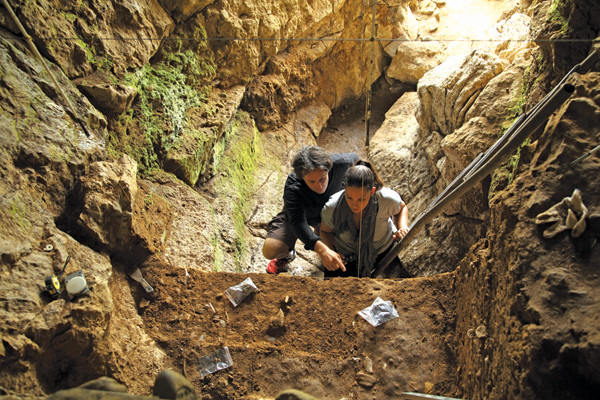
by Mary Caperton Morton Tuesday, December 9, 2014

Researchers Thomas Higham and Katerina Douka examine samples at a Neanderthal site in Abric Romani, Spain. Credit: Thomas Higham.
For a time, _Homo sapiens _and Neanderthals shared space in Europe, likely interacting and possibly interbreeding, but roughly 40,000 years ago the Neanderthals died out for unknown reasons. Pinpointing the extinction of the Neanderthals has proved difficult due to limitations in carbon-14 dating techniques, the accuracy of which declines in samples approaching and older than 50,000 years due to a decreasing amount of carbon-14 for testing. Now, using a new dating technique, scientists have confirmed that Neanderthals likely disappeared between 41,000 and 39,000 years ago.
Using accelerator mass-spectrometry radiocarbon dating, the team, led by Thomas Higham of the University of Oxford in England, found that the Neanderthal disappearance occurred gradually over a few thousand years. The finding lends support to theories that suggest a sustained and complex biological and cultural mosaic in Europe, rather than a rapid replacement of one species by another.
In the new study published in Nature, Higham and his colleagues relied on bone fragments and artifacts from the Mousterian and Châtelperronian stone-tool industries, both thought to be associated with Neanderthals. The pattern of tools suggests that Europe was dominated by the robust hominins about 45,000 years ago, with small pockets of humans, represented by the Uluzzian stone-tool industry. Human populations grew denser and more widespread over the next few thousand years, with periods of overlap between the two populations lasting as long as 4,900 years in some locations in France before Neanderthals disappeared from the landscape.
© 2008-2021. All rights reserved. Any copying, redistribution or retransmission of any of the contents of this service without the expressed written permission of the American Geosciences Institute is expressly prohibited. Click here for all copyright requests.